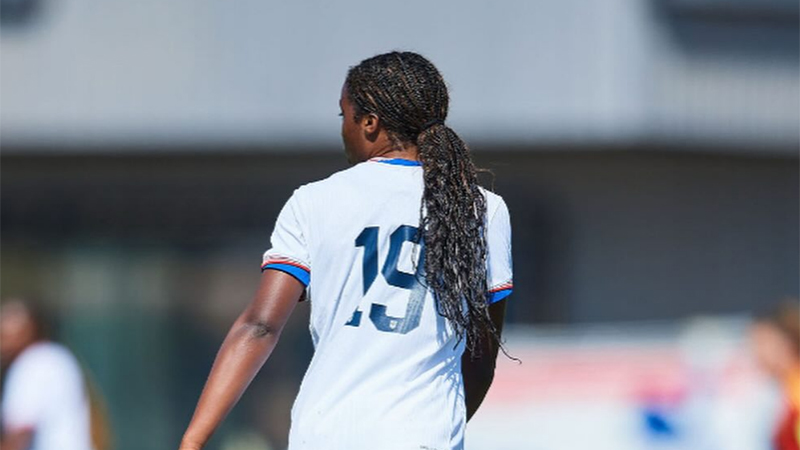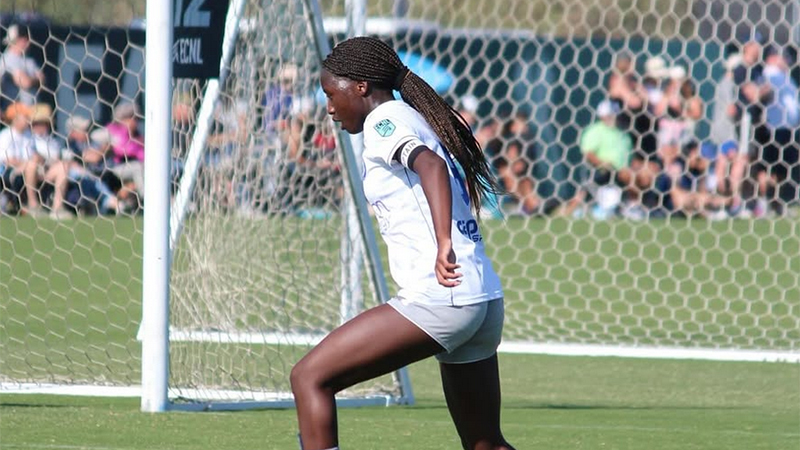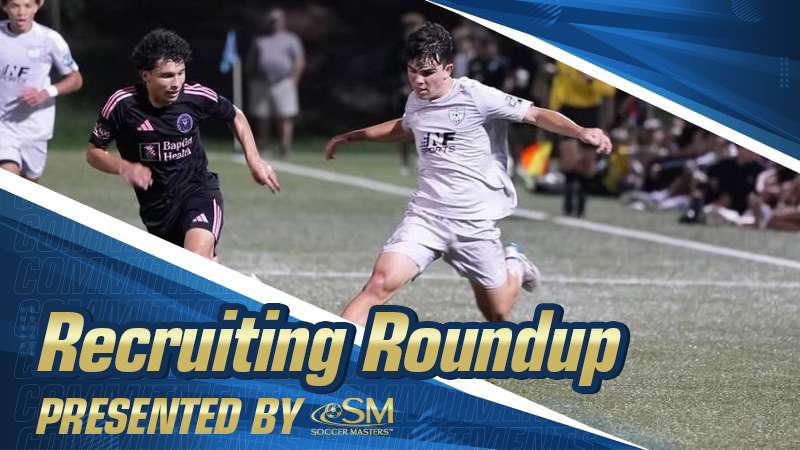Effectively Adapting to New Situations
By: Justin Lafleur, Lehigh Sports Communications
Research in the laboratory takes persistence. You may be convinced you have a formula for success, but hypotheses don't guarantee anything.
Failure is almost inevitable until that breakthrough is reached – whenever that may be – and you need mental toughness to keep working, working and working some more.
This summer, Lehigh women's soccer junior Grace Forsyth learned just that as part of her medical research lab in Santiago, Chile. She was the latest of several women's soccer student-athletes over the last few years to take part in an Iacocca Internship program.
"In a way, this summer was trial and error, and that's something I learned about the research environment," said Forsyth. "You could spend a lot of time thinking and planning the experiments, then it comes back and it isn't what you think, so you have to go back and rethink things."
Boy, that sounds a lot like the game of soccer.
"In the beginning of the season, you have a plan and you think it's definitely going to work," said Forsyth. "Then throughout the season, you have to adapt your plan and change to fit against different teams, how the season is going or how different players develop throughout the season. That definitely lends itself to being adaptable, adjusting to your current problems and creating different plans on the go."

This summer, Forsyth was adaptable in stepping outside her comfort zone on so many levels. The admittedly soft-spoken Forsyth put herself in an entirely new country, working with people who don't speak English.
"I was a research assistant at the Cellular and Molecular Physiology Laboratory of Pontificia Universidad Católica in Santiago, Chile," said Grace, a molecular biology major. "The research project I worked on looked to determine the role of autophagy in the pathogenesis of preeclampsia. In the lab, I carried out experiments and assisted in interpreting results."
Forsyth's work focused on preeclampsia – high blood pressure while pregnant.
"It actually is one of the leading causes of death among mothers and fetuses in the world," she said. "They're unsure of the cause and there's no cure besides giving birth. They're looking to create a way to cure it during pregnancy."
Forsyth worked with Lorena, a PhD student from Chile, running experiments.
"At the beginning of the week, we set out a list of experiments we needed to get done that week," said Forsyth. "I was really lucky because throughout my time there, after I was taught a certain skill, she let me do a lot of things independently. That included taking care of a cell line, running PCR experiments and just helping her. Once we got the data, I analyzed it then determined the next steps in the project, depending on the feedback we received from the experiments."
Lorena's project will take three years, so this summer for Forsyth was a small, but important, component of the end goal.

"We were basically finding out if certain molecular markers were found in the tissue," said Grace. "We would assume a protein is found in this tissue, but then it's not. You have to go back and try the different tissues or look for a different protein, and try to fit that into your overall grand scheme of the entire project."
When looking at the grand scheme of Grace Forsyth's collegiate journey, the Iacocca Internship program will always be an important chapter. She heard great things about the program from teammates who took part in the past, and had a specific goal when choosing her destination this summer.
"I applied to Santiago specifically because I wanted to not only work on my Spanish, but also, I thought Chile would be a great opportunity to become really immersed in the culture," she said. "It's not a very popular travel destination like a study abroad experience in Europe."
Forsyth's expectation of immersion became the reality.
"Living with the host family was very different, and they actually didn't speak any English at all," she said. "They didn't speak any English in the lab, either. They understand English, but day-to-day, all of the lab work is conducted in Spanish. That was definitely a huge challenge, but something I embraced because one of my goals was to work on my Spanish.
"I also found myself learning things for the first time because I hadn't even learned a lot of lab techniques or lab work Lorena was doing," Forsyth continued. "She was very patient and very understanding."
Finding a way to overcome cultural differences only forced Forsyth to grow as a communicator, and person.
"I have a very shy personality and coming out of this experience, I feel a lot more comfortable in Spanish and even English, just putting myself out there and getting my point across in a professional setting," she said. "I feel like I've become more outgoing because you have to be when you're thrown into a different language and need to express yourself."
One way Forsyth expressed herself was a common language… the game of soccer.
"Soccer is huge in Chile, so whenever you tell people you play soccer, they are so excited to hear about it," she said. "My host family invited me to play soccer with them on a Sunday and we went to the park and played like a family, six v six with their cousins, aunts and uncles. It was a great bonding opportunity."
Communication was a theme of Forsyth's growth this summer – communication in the lab, with her host family, etc. – and it should help her on the soccer field for Lehigh this fall.
"Communication skills can definitely translate because the lab environment has so many parallels with teamwork and working on a team," said Forsyth. "The same way we navigate personal problems or team problems in a soccer setting is how you navigate them in the lab."
"I was really excited when I heard about Grace's internship this summer," said Lehigh head coach Eric Lambinus. "Our program prides itself on developing student-athletes in every way during their college careers, and her internship in Chile helps set herself up for success moving forward. Grace has a tremendous influence on her teammates.
"Putting herself in a position (in Chile) where relationships are highly valued hopefully gave her the experience to utilize that influence to inspire her teammates to reach the same level of responsibility and self-discipline she has displayed, both on and off the field."
What's one way Forsyth has an influence on her teammates?

Communication.
"Having open communication is important," said Grace. "Miscommunication in any setting can be very detrimental."
Open communication only helps new relationships develop and helps existing relationships become even stronger. The dynamic between people is another aspect of the Chilean culture that caught Forsyth's attention.
"Their culture is very relationship-oriented," she said. "They're very focused on getting to know each other, and family is a huge value in general. In the United States, it's strictly business and getting your work done before you socialize. In the Chilean environment, socialization was integrated into work. It was really beneficial to know my coworkers on a more personal level, have a more collaborative environment and be a little more relaxed."
Having a collaborative environment helped the 2018 Mountain Hawks make a late-season run to the Patriot League Championship game. The team faced adversity, but because of their camaraderie, was able to step back, reassess then try again – just like an experiment in the lab.
"Relying on each other was important and realizing why we're doing something," said Forsyth. "Taking motivation from each other and focusing on the team's goals was important. Leave every game in the past, come to practice and focus on the next drill, next practice or next game.
"It's important to not dwell on your past failures and just work on what you can do to get where you need to go."
Forsyth is on her way towards a future in the medical field, and this summer was an important step towards reaching that goal.
"The research environment this summer helped me apply what I was learning in the classroom at Lehigh and put it to work in the lab," she said. "My ultimate goal is to attend medical school and be a doctor. Doctors always need to be problem solvers, adapting to new situations."
Whether she's in the lab, on the soccer field or living in a different country, Forsyth has been forced to adapt to plenty of situations, and has come out stronger on the other side.
"From her knee injury during her high school career to her ever-changing role within our team, Grace has been able to successfully overcome obstacles and get the best out of every experience," said Lambinus. "I have already seen the positive effects of her internship this summer in the way she approaches training every single day. You can tell she enjoyed the experience and brings a consistent level of energy so she can improve each day. It is a great attitude and will serve her well in her quest to become a doctor."
Headlines
- Recruiting Roundup: January 5-11
- 2026 Women's Division I Transfer Tracker
- U16 GNT Roster for Trip to Spain
-
Winter Girls HS Players to Watch

-
ECNL Boys FL: Under-16 Players to Know

-
Commitments: Woodstock to Wake Forest

-
Winter Boys High School Players to Watch

- ECNL Boys FL Selection Game Rosters
- TDS Boys Regional Rankings: Class of 2028
- 25 Male Players That Dominated 2025



